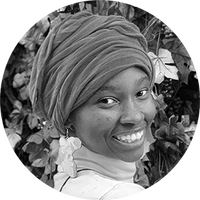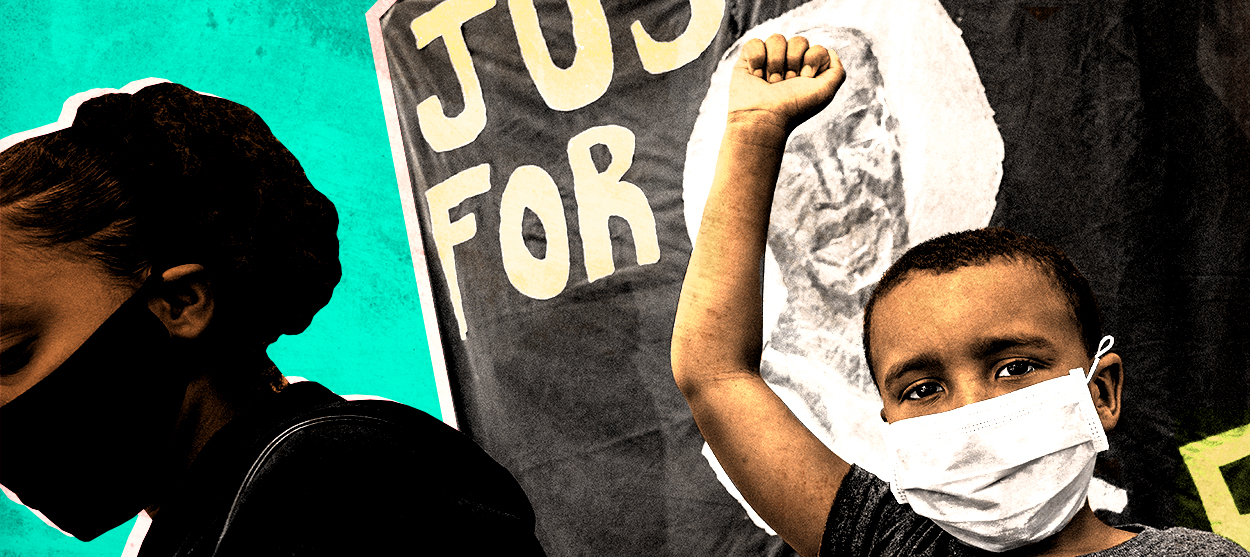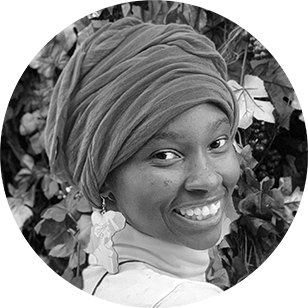The double bind of activism and parenting while Black
I want to make the world safe for my children. Sometimes that means I have to be away from them.


A free daily email with the biggest news stories of the day – and the best features from TheWeek.com
You are now subscribed
Your newsletter sign-up was successful
"Mommy, can you protect me from the bad guys?" my 4-year-old son asks softly while he watches TV. He's thinking of superheroes and villains, and he poses the question with the innocence and curiosity of any other preschooler. But what he doesn't know is that there are "bad guys" everywhere — including the folks who believe he's a bad-guy-in-training just because he's Black.
Admittedly, when the headlines of police brutality and racial oppression have hit me especially hard, I've said, "I don't know. But I'm determined to do everything in my power to try." I take this pledge literally and head to the streets — and the keyboard — to try to manifest a world of goodness. But his repeated pleading — "Mommy, can we please go with you?" — and his sister's crying fits as I'm headed out the door give me pause. "No, baby," I say. "I'll be back soon." But what I mean is: "It's not safe enough for you to go outside, yet."
As a Black mother with a desire to make the world a safer place for my kids, I face a devastating choice: Do I spend time at home with my growing children, or do I sacrifice that precious time with them in order to fight for their humanity?
The Week
Escape your echo chamber. Get the facts behind the news, plus analysis from multiple perspectives.

Sign up for The Week's Free Newsletters
From our morning news briefing to a weekly Good News Newsletter, get the best of The Week delivered directly to your inbox.
From our morning news briefing to a weekly Good News Newsletter, get the best of The Week delivered directly to your inbox.
Often, I feel I must opt for the latter. While the recent uprisings across the U.S., fueled by the horrific murder of George Floyd by a white police officer, have given non-Black folks a free trial's worth of insight into our plight, many white people remain reluctant to take responsibility and work to fight racism with intention. Wyoming, where I live, isn't exactly at the forefront of progressive politics, especially with matters of race. And so I shed light on the insidiousness of racism though educating and organizing in my local community.
When fighting for the humanity of our children, Black mothers like me embody a lineage of pain. We know our sons and daughters face threats — both visible and invisible — to their health and safety that white children do not. I'm forced to mourn the impracticality of the American Dream for my husband, my children, and myself simultaneously. I repeatedly ask myself, Who will love on my children if I've committed myself to trying to save the world?
Black mothers are again unwittingly designated as the nation's domestic servants — cleaning up the world's mess as our children receive a fragmented version of ourselves.
The stress that accompanies this continued lack of shared responsibility in the fight to eradicate racism has long eroded the mental and physical health of Black folks, because there is so very much to fix.
A free daily email with the biggest news stories of the day – and the best features from TheWeek.com
While police brutality is the most visible manifestation of racism, countless individuals also die as an indirect result of discrimination. The looming threat of racism not only leaves Black folks more susceptible to chronic health issues in terms of access to resources — think food, school, and clean air and water — but it also decreases the likelihood that we'll get effective medical and mental health care when systemic oppression starts to deteriorate our overall health.
There is also growing dialogue centering on the consequences of racial trauma, which has symptoms that mirror PTSD. But I don't need facts and figures to know that racism is robbing me of my deserved quality life. My back and shoulders constantly ache from holding a lifetime of tension. The pain and demands of the world overstimulate me in a way that no amount of rest seems to lessen. I know that my unease and oversensitivity hurts my family.
Deep down, I know my kids don't understand why they're getting the scraps of their mother. The state of the world leaves me mostly irritable, dejected, and responding to their requests as if the only possible options are "no" and "not right now, baby."
I'm envious of white parents' ability to "opt-out" of conversations on racism, and all of the free-time that is born from not having to strategically map out one's life in avoidance of racism's many manifestations. I find myself trapped in a loop of self-criticism, wishing that I had the time to engage more and fight less while knowing that fighting now is the only way to achieve freedom later.
How can I tuck my children in and kiss them goodnight with the knowledge that a murderous white supremacist world is out there waiting to make an example of them? At the same time, how can I fight in the streets knowing that I've missed so many bed times, so many opportunities to kiss my kids goodnight?
When I see images of parents living joyfully with their families, seemingly unafraid of these lingering risks, I wonder how they can stay home when racism keeps shapeshifting to rob Black youth of childhood and Black adults of agency.
What does their apathy and avoidance say of my strategy? Should I love on my kids now and emotionally prepare to release them into an undeserving world? Or do I use this time of underdeveloped memory to make whatever headway I can toward greater racial justice? I often wonder how they will retell this stage of our lives, during which I am regularly preoccupied. I pray that they reflect on my efforts fondly.
In the end, I can't help seeing the parallel of my questions and those that my ancestors must have asked. Am I laboring for the benefit of this nation at the detriment of my family?
But like them, did I ever really have a choice?
Want more essential commentary and analysis like this delivered straight to your inbox? Sign up for The Week's "Today's best articles" newsletter here.
A. Rochaun Meadows-Fernandez is an award-winning writer, speaker, and activist working to amplify Black women's voices in the mainstream dialogue, especially within conversations on health and parenting. She is also the founder of the #FreeBlackmotherhood movement.
